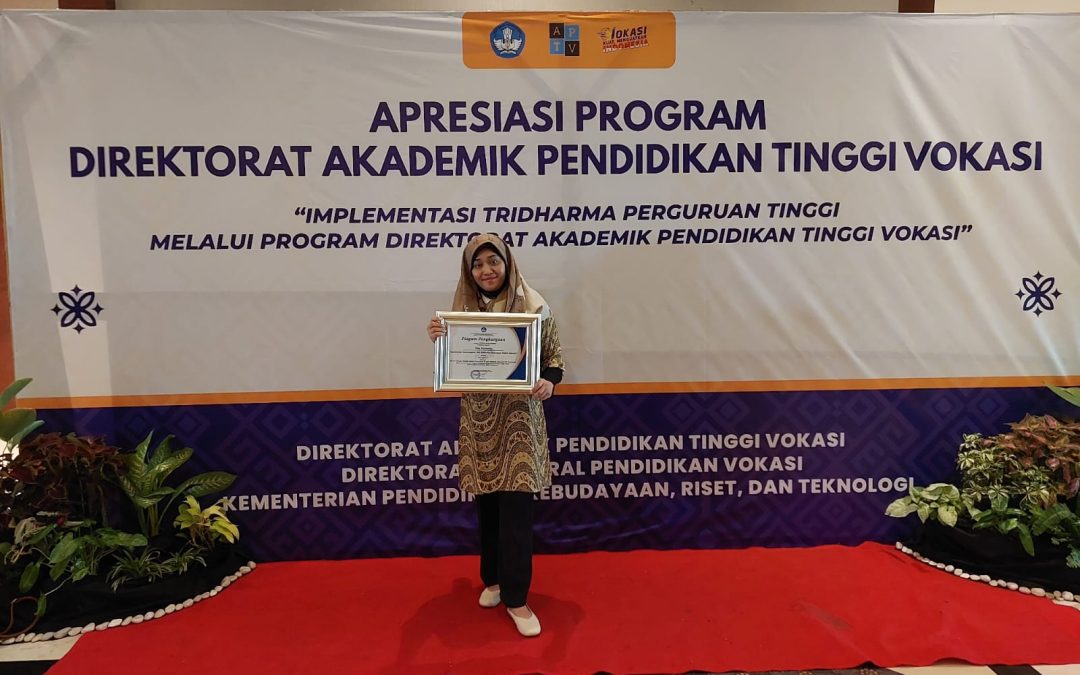Researcher at Undip Vocational Industrial Chemical Engineering Technology Study Program (TRKI) Dr. Eng. Vita Paramita, ST, MM, M.Eng has received an award from the Academic Directorate of Vocational Higher Education in the Intellectual Property (KI) category. The Kemendikbudristek APTV Directorate Program Appreciation Event with the theme Implementation of the Tridharma of Higher Education through the Higher Education Academic Directorate Program, which was attended by all tertiary institutions under the Diksi, was held at the Sahid Jaya Hotel & convention Yogyakarta recently.
Director General of Diction Kiki Yuliati, when opening the awards program, said that the award was given for the dedication and contribution of lecturers’ performance. This appreciation is a step to motivate and encourage vocational universities to continue to improve the quality and quality of education. One aspect of lecturer performance is in the form of KI, which is the outcome of research and community service activities.
Vita said that downstream research with the Mohamad Endy Yulianto, ST, MT, Prof. Research Team. Dr. Eflita Yohana, Dr. Indah Hartati, Dr. Dadan Rohdiana, Didik Ariwibowo, ST, MT and Drs. Sutrisno, MT with the Higher Education Excellence Development Research (PPUPT) scheme funded by the Ministry of Education and Culture. The research with the theme “Commercialization of Caffeine-Free Green Tea Nanopolyphenol Products as Functional Food Incorporation through Enzymatic Inactivation Techniques”, is an innovation in the production of caffeine-free green tea. Research with TKT (Technology Readiness Level) 7 – 8 is currently being implemented at the Green Tea industry partner PPTK Gambung Bandung and ready for mass production.
Vita also said taht the research background was that green tea, which contains polyphenolic compounds such as: catechin, epicatechin, epigallo catechin, epicatechin gallate, epigallo catechin gallate and gallic acid, was stated to have anti-cancer activity, preventing cardiovascular disease, obesity and other degenerative diseases. The broad spectrum of pharmacological activity of green tea polyphenols encourages the process of incorporation into various food products such as bakery, biscuits, donuts, cookies, bakpia, pudding, buns, ice cream, cheese and other functional foods. However, the food industry requires the incorporation of caffeine-free green tea powder to have very high health effects. Therefore, a process is needed to remove caffeine from green tea powder through a blanching process which aims to inactivate the enzymes polyphenol oxidase and hydroperoxidase and extract caffeine.
The incorporation of green tea powder for food and nutraceutical products is limited by the bitter taste of polyphenols and their epimerization at high temperatures with alkaline pH which results in a decrease in polyphenol activity. For this reason, it is necessary to apply bioactive powder production using polyphenol encapsulation techniques using liposome biopolymers which are able to protect bioactive compounds against chemical and physical resistance, increase bioavailability, provide products with high stability, and provide the opportunity to control the release of core material compounds at Vita’s bright targets.
Vita also added that liposomes are small molecule surfactants and consist of amphiphilic phospholipids which are effective for fabricating nanoemulsions using a low energy approach because their structure tends to form bilayers and form closed vesicles, and has the specific property of being slightly soluble in water with a critical micelle concentration (CMC) value. between 10-8–10-12 M. Liposomes have been widely applied as encapsulation materials for medicines and nutritional supplements due to their stability and safety in food and medicine applications. The team is currently collaborating with the green tea industry at the Gambung Tea and Quinine Research Center (PPTK) in South Bandung and various green tea industries to develop commercial products of caffeine-free green tea powder. “The commercialization of nanopolyphenols will have high potential considering that the global market value of nanomaterial products and their incorporated products is expected to increase by up to 50%, so that the results of this commercial research can be useful for people who consume substitute foods or drinks as a substitute for a diet rich in fat and cholesterol,” concluded Vita.
Meanwhile, the Dean of the Undip Vocational School, Prof. Dr. Ir. Budiyono, M.Sc. admitted that he was grateful for the achievements achieved by Undip Vocational School lecturers and added to the list of achievements of Undip Vocational School lecturers. This achievement is proof of how the performance of the Vocational School academic community is recognized at the national level. “Budiyono hopes that research activities at the Undip Vocational School will continue to innovate and develop, and side by side answer problems in society and ultimately produce solutions together.” he concluded.


Recent Comments